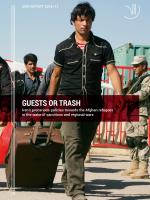Afghans as a bargaining chip
For four decades Iran has hosted one of the world’s largest populations of refugees, counting up to three million Afghans. While the extent of Iran’s state services and assistance to the Afghans has been unprecedented, and should be commended, during the last 10-15 years the state policies have turned increasingly harsh, repatriating and violently deporting as many Afghans as possible. As a consequence, more Afghans from Iran are seeking asylum in Europe.
This report outlines the dilemmas and contradictions of Iran’s policies towards the Afghan refugees and migrants, and it shows how Iran’s Afghan population has become a bargaining chip in the geopolitical crises, Iran has been and still is immersed in: First, the crisis over Iran’s nuclear program has affected the Afghans enormously. When Iran was faced with the threat of a US military attack launched from Afghanistan, Iran used the deportations of Afghans as a tool to pressurise the Afghan government. The international nuclear sanctions have damaged the Afghans’ living standards, their ability to receive international refugee aid and contracted the Iranian government’s willingness to host Afghans. Secondly, the Iranian regime has for several years coercively recruited Afghans to fight in Syria in support of Bashar al-Assad. These recruitments are currently one of the factors explaining why a growing number of young Afghan men decide to leave Iran for Europe.
From a European perspective it is deeply relevant to understand the hardships Afghans face in Iran, partly because some of the Afghans now move on to Europe, partly because the nuclear agreement and lifting of sanctions provide new opportunities for cooperating with Iran. While it is crucial to criticise some of Iran’s policies towards the Afghans, the EU also needs to recognise that the nuclear sanctions have profoundly contributed to the worsening of their situation.
